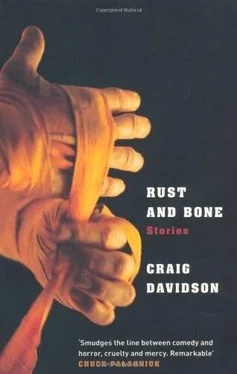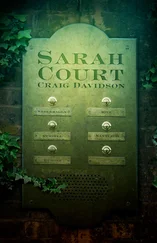“He’s taking away Daddy’s truck,” Henreid went on. “Now Daddy won’t be able to drive you to school, or … to the ice cream parlor.”
“The city’s got a great school-bus system, sweetheart,” Graham said to Charity. “And it’s better to walk to the ice cream shop. Good exercise.”
The girl’s eyes held a faintly panicked cast, likely for no other reason than her father had woken her in the dead of night to converse with a burly stranger. Her arms found their way around Henreid’s waist, head burying into his paunch.
“I know, sweetie, I know,” Henreid said. “Maybe if you ask the man, ask him reeeal nice, he’ll let Daddy keep his truck.”
“I can’t do that, Charity.” Graham’s eyes were fixed on Henreid. “You might want to ask your Daddy why he’s driving such a spiffy truck when he could spend a few bucks to put some braces in your pretty mouth.”
“Hey, don’t you talk that way—got no damn right!”
Graham raised his hands in the manner of a surrendering PoW. “You’re the boss. Come up with the truant payments, your truck’s back at the dealership.”
He stepped up into the tow truck’s cab. The engine caught with a full-bodied rumble, the diesel’s tik-tik-tik breaching the dark silence. Graham pulled out onto the street. Henreid and his daughter dwindled to morose specks in the rearview.
THE SNOW LET UP, leaving the streets slick with a brilliantine shine. Graham drove through quiet neighborhoods, postwar Normandy houses banded by hawthorn hedgerows interspersed with modern flatroofed structures that stuck out, as Nell might say, like cocktail olives on an ice cream sundae. In the early morning hours the streets seemed remote and unreal, a dreamscape envisioned by someone of limited imagination. The only sign of human life glimpsed through the windows of all-night diners and coffee shops, a rogue’s gallery of sunken-eyed loners and insomniacs, men and women who’d reached the end of their tether and hadn’t quite realized it.
The first time Graham noticed his wife shaking, they were dining at an Italian restaurant. Waiting for their meal to arrive, Graham heard a sly tinkling: his wife’s hand trembled atop her cutlery, knife fork spoon arrayed neatly upon a white tablecloth.
“Honey, you’re shivering.”
Nell glanced at her hand, flattened her palm to the table. “Drafty in here.”
Graham agreed it was. A few minutes later, her hand shook again. Nell jammed it between her legs and pressed her thighs together. When the food arrived, she couldn’t hold her fork. In desperation she clutched it in her fist, the way a child might. She set it down with a clatter and ran a hand through her hair, that hand quaking badly, laughing, saying, “Silly, silly, silly,” under her breath.
“Are you alright?”
“Yes, fine. Just … stress. Work’s been hectic. It’s so damn cold in here.”
Graham placed a hand on Nell’s arm. Her body vibrated faintly, a deep-seated tremor originating at the very heart of her. Graham’s childhood home had been within earshot of a busy railyard. As a precaution, his father taught him to place his hand on the tracks before crossing: if the track trembled, it meant a train was near. That’s how Nell’s arm felt: a section of track trembling before an approaching locomotive.
“We should go home.”
“I’m okay.” She smiled, then lowered her eyes, as though embarrassed. In that moment, Graham knew she’d suffered with this for some time—a few days, a week, a month?—without telling him. Tough, proud, foolhardy woman. “Finish your dinner, Graham. It’s getting cold.”
The Dodge dealership hung suspended in a wash of halogen light. Showroom garlanded with plastic flags the shape of baseball pennants, fluttering faintly in the night wind. Two prices soaped on the windows of cars and trucks, a slash run through the higher one, suggesting the salesman, in a fit of improvident and potentially bankrupting bonhomie, had elected to cut his customers a rare deal.
Graham unlocked the impound lot’s gate and nosed the Freightliner through, parking Henreid’s truck between a Ford Bronco and a Jeep Cherokee. He dropped the keys in the nightbox. The next job was on the other side of town. A mobile home. He poured a cup of Nutrasweet-laced coffee from a silver thermos and set off southwards.
After Nell was diagnosed with Bradykinesia, their relationship changed. A distance developed between them, expressing itself in small ways. They didn’t touch one another as much, where before they always squeezed shoulders, patted bottoms, held hands. Graham knew this was because Nell didn’t want him to feel her shaking; after one particularly ugly argument, he’d entered into unwilling accord. They passed hours together in silence, where before they’d discussed every daily triviality—again, this was at Nell’s instigation, as she was self-conscious of her worsening stutter.
A pall of futility hung over their marriage. All the things that had seemed so imminent—financial security, children, ripe old age—were no longer. They felt as though the future had been misrepresented, falsified. They fell to contemplating all those things not done, things they’d always believed there would be time for, later. All the vaguely instructional clichés by which they’d conducted their lives—Hard work pays off, Good things happen to good people, Someday our ship will come in—were worthless in the face of this mindless, devouring disease.
Graham prayed. Not having grown up in a religious household and ignorant of all things devotional, he composed prayers like business letters, each no more than a veiled Faustian pact: Dear God, if, in your infinite wisdom, you can see your way clear to cure my wife, feel free to take ten—no, fifteen—no, twenty years—off my life, or give me leprosy or strike me with a lightning bolt. Please consider my offer, I think you’ll find it a fair one, amen.
THE HOUSE WAS A RAMBLING TWO-STORY: latticed mullions on catherine-wheel windows, meticulously landscaped lawn, shrubs swaddled in canvas and bound with twine. It backed onto a man-made lake, one of several in the city: pulling up, Graham glimpsed water through gaps in the foliage, moonlight glancing off ribbed waves. A lip of light spilled beneath the garage door; every so often, that lip was darkened by the shadow of a passing foot.
The motorhome, a late model Chinook Summit, was parked at the end of a wide interlocking brick driveway, parallel to the garage. Standing in the RV lot, the owners had no doubt imagined rambling, cross-country journeys, sultry nights parked on lake shores lit by a harvest moon—just like in the sales brochure. Of course job, family, and other obligations rendered their freewheeling fantasies just that, resigning the motorhome to its current role as a repository for dust, cobwebs, and shed maple keys. Graham repossessed many such luxury impulse items: Sea-Doos, bass boats, catamarans, executive nautilus equipment. The owners seemed to think since they weren’t actively using these toys, they should be spared the onus of paying for them.
The camper door hung ajar. Graham picked his way through the cramped living space, puzzled to find signs of active habitation: his penlight swept countertops littered with empty potato chip bags and crushed beer cans; the kitchen table and captain’s chairs held hamster cages; a twenty-five-gallon aquarium sat on the floor, next to a chicken-wire cage scattered with brown feathers. The predominant smell was of cedar shavings, and below that the ammoniac odor of rodent piss.
Graham slid behind the wheel and dropped the gearshift into neutral. The camper rolled down the drive’s smooth grade, Graham pumping the brakes gingerly. He wedged blocks of wood under the tires and slid under the RV’s bumper, squinting up into the dark topography of linkages and drive shafts, wiping beads of coolant off the radiator grille to stop them dripping onto his face.
Читать дальше












